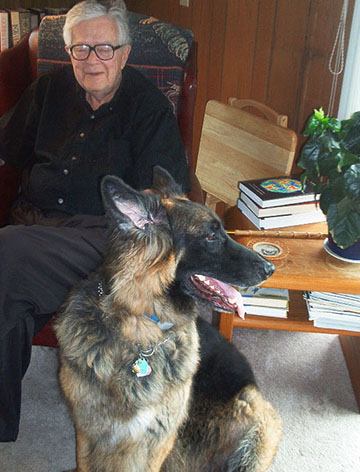
Donald H. Wollett and his dog Major
We’re skewed towards the political end and not concerned enough with law these days. Today, our rule of law has brought travesties in the name of justice thanks to our adherence to an adversarial system, where, reaching up to the U.S. Supreme Court, our highest court in the land, the object is to win, not to serve humanity. We must adhere to notions such as innocent until proven guilty. We must understood that a commitment to fairness and justice sustains not only our civil relationships, but also our deepest humanity. Don Wollett interview (2003)
Don Wollett served for over 50 years as a labor lawyer and a professor of constitutional and labor law.
A skilled educator and negotiator, Don Wollett was an important figure in the formation of U.S. labor law.
Over the years, he represented unions and management in both the public and private sectors.
Don Wollett's belief was that the law should be for the people, not lawyers.
His belief was initially shaped by his midwestern upbringing and the education he received at the University of Chicago during the 1930s. This was an education grounded in a more holistic and inclusive approach, including an emphasis on the social sciences and philosophy.
Legal educators were strong defenders of civil liberties during tumultous times. They laid the groundwork for the coming era of civil rights.
This changed following WWII as lawyers were increasingly detached from the humanities and social concerns.
That never happened with Don. His sense of justice emerged when he was 17-years-old and he won an award for his critique of the US Supreme Court. The supreme court has had a conservative bent over time. When it was more liberal it did not come with much of a manual. When Don was 17 he won a prestigious statewide award for his essay Nine Old Men in support of Roosevelt's court packing plan. He wanted to be a minor league baseball player like his father. instead he entered the field of justice with this essayHis time as Captain on the SC511 taught him about leadership and the rights of others. He belonged to a cadre of the finest legal minds of the time. As a professor at several prestigious universities he passed on his ethics and beliefs in the rule of law to notable jurists.